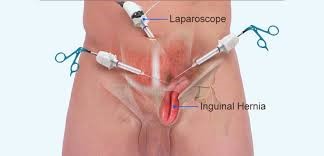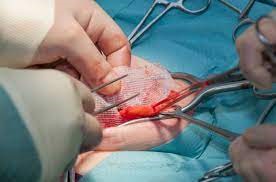Your muscles are usually strong and tight enough to keep your intestines and organs in place, but a hernia can develop if there are any weak spots. What happens during surgery? There are 2 ways an inguinal hernia repair can be performed:
open surgery: where a cut is made to allow the surgeon to push the lump back into the abdomen
laparoscopic (keyhole) surgery: a less invasive, but more difficult, technique where several smaller cuts are made, allowing the surgeon to use instruments to repair the hernia
There are advantages and disadvantages to both methods. The type of surgery you have depends on which method suits you, and your surgeon's experience. You should be able to go home the same day or the day after surgery. It's important to follow the instructions you're given while in hospital about how to look after yourself. This includes eating a good diet to avoid constipation, caring for the wound, and avoiding strenuous activities.Most people make a full recovery from inguinal hernia repair within 6 weeks, with many being able to return to work and light activities within 2 weeks.
Ask your surgeon or GP for advice on when it's safe for you to drive again. You should also speak to your insurer before driving again after having surgery.


Recovery
You should be able to go home on the day of, or the day after, your operation. Get an adult to take you home in a car or taxi and follow any instructions you're given by the hospital. After the operation, your groin will feel sore and uncomfortable. You'll be given painkillers to help relieve this discomfort.
Looking after yourself
An adult must stay with you for the first 24 hours after your operation in case you experience any problems.
If you're still in pain after going home, continue taking painkillers as advised by the hospital. Applying gentle pressure to your wound using your hand, or a small pillow can make coughing, sneezing and moving between sitting and standing more comfortable.
Make sure you follow the instructions your nurse gave you about caring for your wound, hygiene and bathing.
Activities
If the operation was carried out under a general anaesthetic (which puts you to sleep during your operation) , your co-ordination and reasoning may be affected for a short time. Avoid drinking alcohol, operating machinery or signing legal documents for at least 48 hours after any operation involving general anaesthetic.
Over time, you can gradually return to your normal activities as soon as you're able to do them without feeling any pain.
Most people are able to do light activities, such as shopping, after 1 or 2 weeks. You should also be able to return to work after 1 or 2 weeks, although you may need more time off if your job involves manual labour (typically 4 weeks for manual labour).
Gentle exercise, such as walking, can help the healing process, but you should avoid heavy lifting and strenuous activities for about three weeks. The main reason is that such activity causes pain – there is little evidence to suggest that such activity causes your hernia to recur.
You may find sex painful or uncomfortable at first, but it's usually fine to have sex when you feel like it.
Driving
Speak to the medical professional in charge of your care for advice about when you can drive. It's usually advisable to avoid driving until you're able to perform an emergency stop without feeling any significant discomfort (you can practice this without starting your car). This is typically after a few days, although if someone else can drive for you, that is better for 1-2 weeks.
It's usually recommended that you contact your car insurance company before starting driving again – insurance companies can have their own rules.
When to call a doctor
Call your surgeon if you develop any of the following symptoms:
- persistent fever over 38C (100.4F) or chills – bleeding
- increased swelling or pain in your abdomen pain that is not relieved by painkillers
- persistent nausea or vomiting
- persistent coughing or shortness of breath
- increasing redness surrounding your incisions - difficulty passing urine